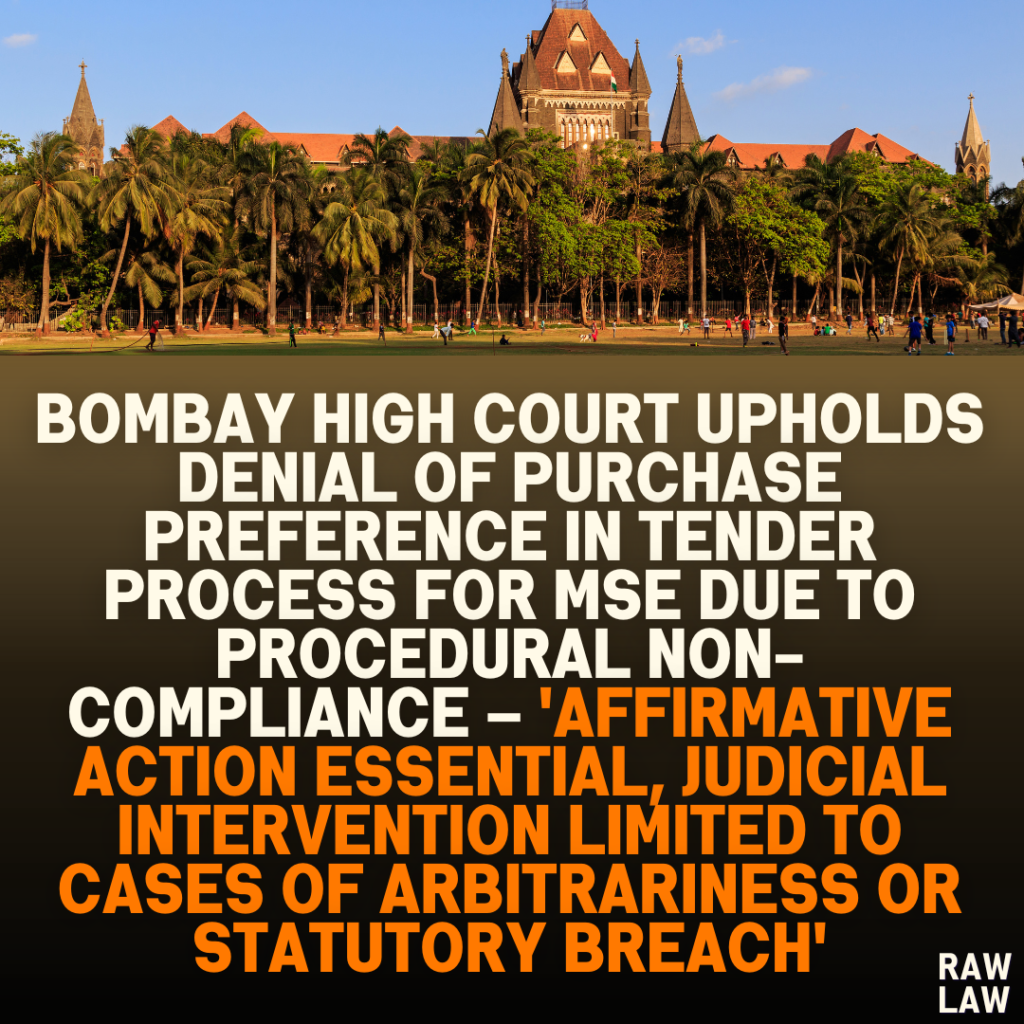Court’s Decision:
The Bombay High Court dismissed the writ petition filed by the petitioner, a Micro and Small Enterprise (MSE), challenging the denial of purchase preference in a tender issued by the respondent for implementing a Track and Trace system. The court held that the petitioner failed to comply with specific procedural requirements for availing purchase preference, emphasizing that judicial intervention in tender processes is limited to cases where arbitrariness or statutory violations are evident.
Facts:
The tender in question was published on the Government e-Marketplace (GeM) platform by the respondent, seeking bids for a sophisticated Track and Trace system. The petitioner, an MSE, submitted its bid and participated in the reverse auction, emerging as the lowest bidder (L-1). Following the auction, disputes arose regarding the petitioner’s eligibility for MSE purchase preference, which was not applied to the petitioner due to its failure to explicitly select this preference during the bidding process. The respondent awarded the contract to another qualified MSE bidder, which complied with all procedural requirements.
Issues:
- Whether the petitioner complied with the procedural requirements to avail of purchase preference as an MSE.
- Whether the respondent’s subsequent price adjustments and award of the contract to another bidder were arbitrary or breached tender norms.
- Whether judicial intervention in the tender process was justified.
Petitioner’s Arguments:
The petitioner argued that its MSE registration should automatically entitle it to purchase preference benefits. It asserted that no specific mechanism for selecting purchase preference was provided in the tender document or GeM portal. The petitioner claimed it fulfilled all eligibility requirements and that the denial of purchase preference was unjust and arbitrary.
Respondent’s Arguments:
The respondents contended that the tender and GeM portal clearly required bidders to select the purchase preference option explicitly. They argued that the petitioner did not exercise this option and thus was not entitled to the purchase preference. The respondents further stated that the price adjustments and award of the contract to a qualified MSE bidder were in accordance with the tender conditions and the Public Procurement Policy for MSEs.
Analysis of the Law:
The court referenced key legal principles from Jagdish Mandal v. State of Orissa and Tata Motors Ltd. v. BEST, which establish that judicial interference in tender processes is limited and should only occur when there is a clear breach of constitutional or statutory provisions or manifest arbitrariness.
Precedent Analysis:
In Jagdish Mandal, the Supreme Court restricted judicial interference in tender matters, highlighting that courts should avoid acting as appellate bodies in administrative decisions. In Tata Motors, the Court reiterated that judicial review of tenders should be exercised sparingly, particularly when dealing with technical requirements.
Court’s Reasoning:
The court found that the petitioner failed to provide evidence, such as system-generated records or screenshots from the GeM portal, demonstrating that it opted for the purchase preference. The tender conditions required affirmative action to claim purchase preference, which the petitioner did not fulfill. Additionally, the court observed that the procedural adjustments made by the respondent, including price modifications, were justified due to changes in the scope of work and followed established tender protocols.
Conclusion:
The court concluded that the petitioner’s claim for purchase preference lacked merit due to its failure to meet the procedural requirements in the bidding process. It found no basis for judicial intervention, as the respondents acted within the tender framework and provided sufficient transparency and justification for their decisions.
Implications:
The judgment underscores the importance of strict adherence to procedural requirements in tender processes, especially for MSEs seeking purchase preference. It reinforces judicial restraint in tender matters, affirming that courts will intervene only when there is a manifest irregularity or breach of statutory norms. This ruling serves as a caution for bidders to carefully follow tender procedures to avoid disputes and underscores the GeM portal’s automated processes as a safeguard against arbitrariness.




Pingback: Gauhati High Court Orders APSC to Recognize AICTE-Approved Equivalence and Expedite Appointment of Petitioners for Assistant Professor (Technical) Posts Within 30 Days - Raw Law